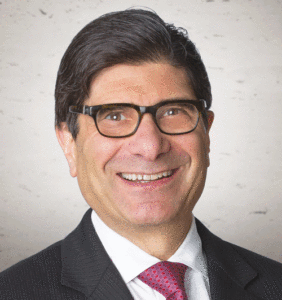By ADRIAN GLASS-MOORE / Assistant Editor
In his day job, attorney Robert Aronson helps medical doctors and academics from abroad get permanent residence in the U.S. His expertise in this area of immigration law has earned him clients including the Mayo Clinic, the University of Colorado and the University of California, San Francisco.
In this field, the worst-case scenario is a health care professional returning to her home country, where as a highly-skilled worker she’ll almost certainly be able to find work.
When it comes to Aronson’s second job with HIAS, the Jewish organization that helps refugees reach safety, the stakes are far higher.
“There’s no alternative for a lot of these people,” Aronson said in an interview at his office at Fredrikson & Byron, the downtown Minneapolis law firm where he works. “Going back is a sentence to death or terrible, terrible conditions.”

Following his election as the new chair of the HIAS board of directors, a position he assumed on July 1, Aronson sat down for more than an hour with the Jewish World last month to discuss the nonprofit’s Jewish character and how it can successfully advocate for refugee rights under a president who’s openly hostile toward immigrants.
HIAS has opposed the government’s policy of separating families at the border, noting the psychological toll on children and their parents. HIAS has also condemned raids on immigrants carried out by Immigration and Customs Enforcement (ICE) as “unnecessary and inhumane.”
Aronson said it’s crucial to change the public conversation surrounding immigrants, who have been demonized, and recognize that refugees are driven by a desire for a better life for themselves and their children.
“This is central to the Jewish experience,” he said. “We’ve been a migratory people and we make decisions as a people, if this life is suitable, and if it’s going to be good for my kids.”
That’s not to say that every person should be admitted, he said, but there should be an efficient, fair process—unlike what is happening now. “People deserve a hearing,” Aronson said. “It should be before a dispassionate tribunal. There is no reason for mass detention; there’s no reason for criminalization; and very frankly the family separation boggles the mind.”
HIAS is one of nine agencies that administer the U.S. refugee program. The number of refugees permitted into the U.S. is 30,000 this year, less than half the number under President Obama.
A “lightning rod” for bigotry
HIAS was founded as the Hebrew Immigrant Aid Society in 1881, with an office on the Lower East Side of Manhattan, to help Eastern European and Russian Jews escape pogroms and come to the U.S. Since then, the nonprofit says it’s helped 4.5 million people flee persecution.
“We handled every major migration of Jews seeking safety,” Aronson said. “Pre-revolutionary Russia, the Soviet Jewry migration, the Holocaust, North African and Middle Eastern exodus — you name it.”
Along with helping Jews come to the U.S., HIAS helped relocate Jews to Palestine during the Holocaust. In later years, HIAS worked on relocating Moroccan and Ethiopian Jews to Israel.
Over time, the number of Jewish refugees dwindled practically to zero, causing an identity crisis for HIAS. Would it close up shop, or direct its considerable resources to needed projects?
“The HIAS board was kind of faced with, ‘If we only do Jewish rescue, our day is gone, we just have no further relevance. Or should we take all of our expertise and address it to other oppressed populations?'” Aronson said.
Based on his belief that Jewish values fit with helping refugees, Aronson supported an expansion of the HIAS mission. HIAS is concerned with people facing persecution in Syria, Darfur, South Sudan and Eritrea. Last year, the agency urged the Trump administration not to cut U.S. financial support for Palestinian refugees, to no avail.
At home in the U.S., the nonprofit is taking a strong stance on the crisis at the southern border.
Aronson said HIAS has established offices in El Paso, Texas, and San Diego to provide legal help to asylum seekers, mainly from Central America. HIAS will open an office in Mexico on Aug. 1, he added.
In the process, HIAS has become “a lightning rod for anti-Semitism and xenophobia,” Aronson said. The nonprofit was particularly despised by a gunman who killed 11 people at the Tree of Life synagogue in Pittsburgh on Oct. 27, 2018.
The white gunman, who ranted on the internet about HIAS bringing in “invaders… that kill our people,” took special notice of the National Refugee Shabbat event, organized by HIAS on Oct. 20.
“We had the whole Jewish community, nationwide, focused on refugee matters and what’s going on, and then a week later,” the shooting happened, Aronson said.
The shooting thrust HIAS into the national spotlight. In the aftermath, Aronson said both Jews and non-Jews offered tremendous support. UN Secretary-General António Guterres asked to meet with HIAS leadership to pay his respects.
Although Aronson isn’t fearful, he said security is a priority for HIAS employees. “That’s really sad, but that’s the new reality,” he said.
A HIAS upbringing
Aronson, who’s 70, is married with two adult children and lives in Minnetonka, where he belongs to Adath Jeshurun Congregation. Born in Chicago, he was raised just outside the city in Skokie, Ill., a community with a large Jewish population. He grew up hearing about HIAS.
Aronson’s mother told him that HIAS brought over his grandparents on both sides “and what it meant to them to have this lifeline,” Aronson recalled.
He became interested in global events, the causes of persecution and the solutions to those problems. “I had just a marvelously positive spin on HIAS from a kid,” he said.
He majored in Russian at Indiana University and then got his master’s degree in Russian literature from the university’s Department of Slavic Studies in 1974. Although he originally saw himself becoming a college teacher, he decided to pursue law, getting his J.D. from Indiana University School of Law in 1976.
“I had a pretty interesting professional skillset of Russian and immigration law,” he said, which prepared him to handle asylum claims of Soviet Jewry.
Aronson ran Moscow operations for Bloomington-based computer company Control Data Corporation in the early ’80s. He arrived in the Twin Cities in 1984.
With the support of Max Kleinman, executive director of the Minneapolis Jewish Federation at the time, Aronson joined the HIAS board in 1988.
Starting in 1986, Aronson practiced immigration law at his own boutique firm (Ingber & Aronson and later, Aronson & Associates) before joining Fredrikson & Byron in 2015.
Despite animosity toward immigrants, HIAS shows no signs of being deterred from its mission to help refugees. The agency’s work is a form of giving back, Aronson said.
“This is why I’m here,” he said. “This is why the whole Jewish community is here: because of our roots in HIAS. It’s payback time.”
(American Jewish World, August 2019)



















